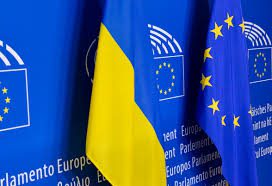
President of Ukraine Volodymyr Zelenskyy has discussed with President of the European Commission Ursula von der Leyen progress in Ukraine’s implementation of the recommendations of the European Commission.
During a call with von der Leyen we condemned today’s Russia’s missile attacks. Welcomed new package of sanctions and agreed on further pressure on Russian aggressor,” he said on Twitter Thursday.

The State Emergency Service has developed recommendations on organizing shelters in the facilities of the civil protection fund for personnel and children (pupils, students) of educational institutions, the Ministry of Education and Science reports.
According to the press service of the ministry, the shelters must meet the following requirements: be located in the basement (underground) premises, on the basement or ground floor (subject to the provision of building envelopes); be located as part of the main building of the educational institution or in close proximity (up to 100 m); not be placed near large tanks containing dangerous chemical, flammable, combustible and explosive substances, water and sewer mains; should not be adversely affected by ground, surface, process or waste water; equipped with power supply, artificial lighting, water supply and sewerage systems (in the absence of water supply and sewerage facilities, they must contain separate rooms for the installation of remote tanks); do not have large openings in the outer enclosing structures, the existing openings (except for doors) provide the possibility of laying (with sandbags or soil, concrete blocks, brickwork); provided with at least two evacuation exits, one of which may be emergency (when planning a shelter in a dual-use structure or a simple shelter with a capacity of less than 50 people, one emergency exit is allowed); water and sewer mains, other main engineering communications (except for intra-house engineering networks) should not pass through the shelters; the premises do not store flammable, chemical and radiation hazardous substances, dangerous equipment that is not subject to dismantling or cannot be dismantled within 24 hours; the height of the premises of objects, in particular doorways, is at least 2 m (at least 1.8 m is allowed if it is provided for by the project documentation), and to the protruding parts of individual building structures and utilities (with the exception of doorways) – at least 1 .4 m. The width of the doorways is at least 0.9 m (not less than 0.8 m is allowed, if it is provided for by the project documentation); openings at entrances (exits) are closed with reinforced doors made of non-combustible materials (metal or wooden, upholstered with iron) or protective screens (stone, brick, reinforced concrete) to a height of at least 1.7 m; the main premises intended for sheltering the population have forced or natural ventilation; free access should be provided for people with limited mobility (for educational institutions with the presence of this category of people) or there is a technical possibility of retrofitting within 24 hours; the object must be in a satisfactory sanitary and fire-prevention condition (in accordance with the norms of fire-prevention and sanitary rules); the necessary protective properties must be provided to protect against conventional means of destruction and external ionizing radiation established for anti-radiation shelters (a dual-use structure with appropriate protective properties).
“The necessary protective properties are provided by objects with walls 2-2.5 bricks thick or from solid reinforced concrete structures (blocks, panels) with a thickness of 56 cm. The corresponding protective properties are also provided by a layer of soil 67-78 cm thick (sandbag laid) across In case building structures have a smaller thickness, it is possible to increase the protective properties by additional imposition with bags of soil or sand, installation of screens made of reinforced concrete structures (panels, blocks, etc.),” the recommendations say. It is noted that the equipment of shelters is calculated for a continuous stay of at least 48 hours, so it is necessary to provide: places for sitting (lying), you can use chairs, benches or beds available in institutions, sports mats, mats; containers with drinking water (1 person / 2 liters per day); food containers; remote tanks for tightly closed sewage (for non-sewered buildings and structures); backup artificial lighting (electric lanterns, candles, kerosene lamps) and power supply; primary fire extinguishing means (according to established standards); means of providing medical care; means of communication and notification (telephone, radio, Internet, it is recommended to install Wi-Fi devices); entrenching tools (bayonet and shovels, crowbars, axes, saws, hacksaws).
In addition, one of the requirements is to comply with the rule of at least a meter per person.

The delegation of the National Democratic Institute (U.S.) and deputies of the European Parliament have prepared 51 recommendations to get ready for the 2019 elections in Ukraine, in particular, they recommended Facebook opening an office in Kyiv, regional director of programs of the Eurasian region at the National Democratic Institute Laura Jewett has said.
Facebook should open an office in Ukraine and, together with other digital platforms, unite to fight disinformation … If we are talking about fighting Kremlin interference to ensure stability in the country, then social networks and digital platforms should help Ukraine in these aspirations. All candidates must have equal access to the media. You also need to combat with the negative impact of misinformation. It is necessary to make efforts to combat manifestations of political corruption, including falsification, and to monitor the financing of parties, she said at a press conference in Kyiv on Saturday.
According to Jewett, it is also necessary to adhere to the equal gender representation of women and men.
Candidates’ campaigns should rest on constructive proposals, be aimed at unification, and the media should note that this is political advertising, not information, she explained.
In turn, MEP Dariusz Rosati noted the intensification of misinformation in Ukraine.
Our recommendations are aimed at encouraging the Ukrainian authorities to adopt key reforms in the electoral legislation and beyond, which will help ensure that the elections are fair and transparent, he explained.
MEP Rebecca Harms clarified that the need to introduce a proportional electoral system instead of a mixed one had been discussed at a meeting with Ukrainian Parliament Speaker Andriy Parubiy.
After the meeting with the CEC (Central Electoral Commission) we recommended the parliament include internally displaced persons and labor migrants in the electoral process, she added.
In addition, the delegation recommended that resources be provided to the CEC for updating technical tools to combat cyber attacks.